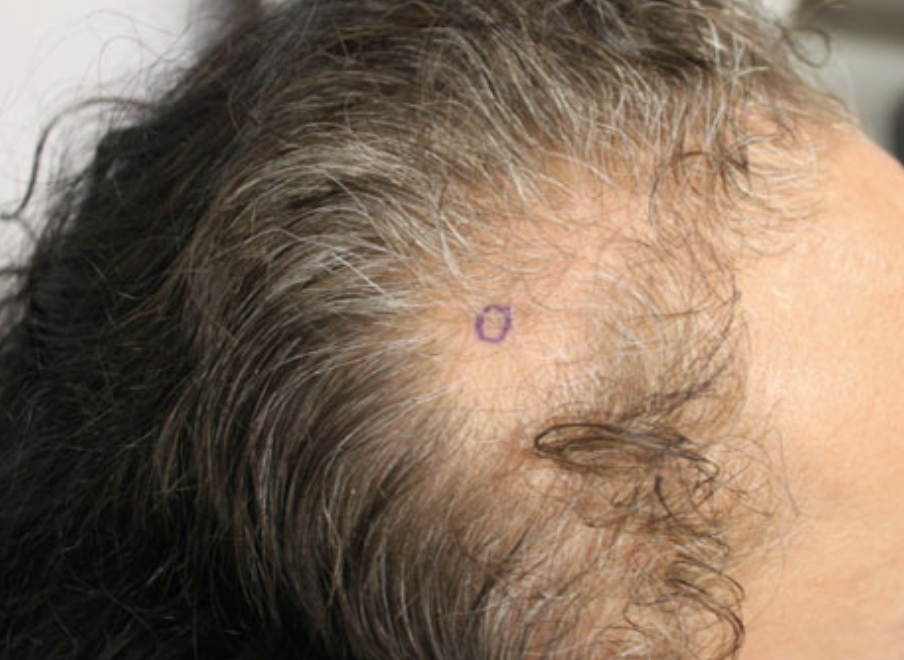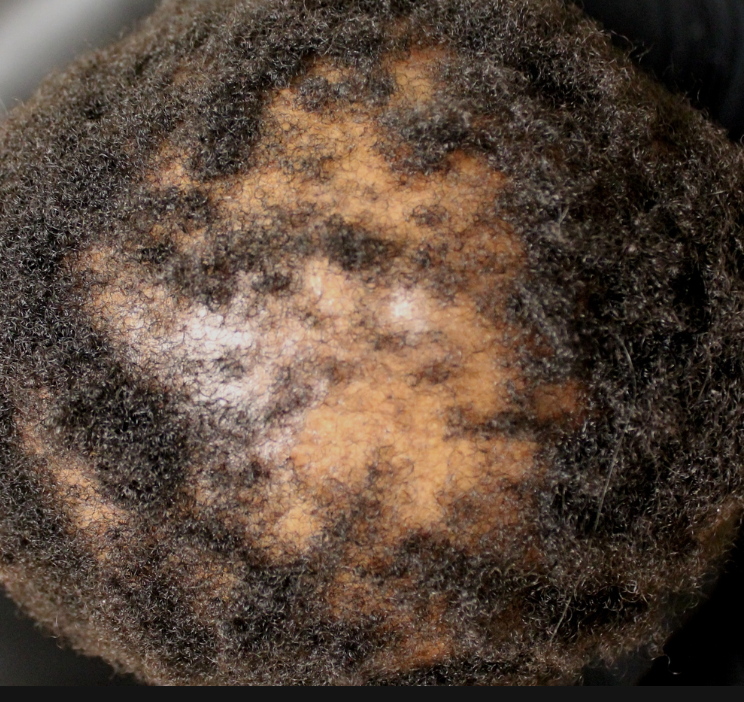Hair Loss from Relaxers
Question
Can my scalp be treated after severe damage from a hair relaxer?
Answer
Thanks for the great question. This is such an important question and also a very common one. There is a lot to discuss. As you’ll see, the answer to your question is ‘maybe.’ Some patients with hair loss form relaxers will grow back their hair. Some patients do not.
Let’s begin.
When a patient says to me they have hair loss from a relaxer, it’s important to keep in mind that there is not one type of hair loss that they might have. In fact, they might have one or more of many types of hair loss, including hair breakage, inflammatory scarring alopecias, hair loss from chronic inflammation, traction alopecia, telogen effluvium or androgenetic alopecia. Some patients just have one type of hair loss. Others have two or three.
Let’s take a look.
1. Hair breakage (Trichorrhexis nodosa)
Both chemical and heat relaxing of hair can cause breakage of the hair. The hairs simply break off because of the damage to the delicate strand. The heat or chemicals cause “micro tears” in the hair shaft which we call “trichorrhexis nodosa.”
The photo below shows a picture of a hair fibre that has such a tear.
Trichorrhexis nodosa of a hair fiber. This can occur from many agents including heat and chemicals used to relax hair.
If trichorhexis nodosa is the only reason for the hair loss, the hair will grow back. The damaged sections may need to be cut off, but the long term prognosis is good. It may take 6-9 months before hair returns back to the way it once was but it will return. Unfortunately, trichorrhexis nodosa as the ONLY and sole reason for a person’s hair loss from relaxers is not common. Ofter there is another reason present as well, and these are discussed below.
2. Telogen Effluvium
Many patients who come to see me with concern about their hair after using a relaxer also have a a diagnosis of telogen effluvium or “TE.” Telogen effluvium is a type of hair loss that occurs when the body feels some type of shock. This can occur from low iron (low ferritin), thyroid problems, anemias, crash diets, weight loss, stress, medications, and illness. Some of these issues such as anemia and low iron levels may make the hair slightly weaker and slightly more susceptible to hair damage. These issues must be addressed fully. For this reason, I always order blood tests for ferritin, 25 hydroxy-vitamin D, TSH, CBC, ANA in all patients who come to see me with concerns about hair loss from a relaxer. Other causes must be fully evaluated.
3. Traction alopecia.
Traction alopecia is a type of hair loss that occurs from the chronic pulling of hair. Patients who use relaxers may be more susceptible to traction alopecia because their hair is subjected to many pulling forces during relaxers and the hair fibers may be weaker. Traction alopecia can occur anywhere on the scalp. The frontal regions near the temple are often a common site of traction.
Treatment for traction alopecia involves stopping the pulling forces that caused the traction in the first place. If traction alopecia is diagnosed and pulling is stopped immediately (within a few months of the new hair care practice), hair might grow back. However, if traction alopecia has been present many months, the hair may not fully return. Long standing traction alopecia is permanent and may even continue to progress once the hair pulling is stopped.
Traction alopecia of the frontal hairline.
4. Scarring Alopecia and Chronic Inflammation .
It’s a little known fact but chronic use of relaxers, especially chemical relaxers, can create scalp inflammation. It may not be a type of inflammation that can be seen on the surface but rather a type of inflammation that is occurring deep under the scalp. In some people using relaxers (but certainly not all people), this chronic inflammation triggers the body to also create scar tissue beneath the scalp. The exact mechanism is not clear but micro injury to the skin creates microinflammation and chronic microinflamation may induce scar tissue to form.
This pattern of hair loss from relaxers has been most carefully studied in women with afro-textured hair but likely applies to all hair types. Chronic use of relaxers in women with afro-textured hair may be linked to the development of several types of hair loss including traction alopecia and central centrifugal cicatricial alopecia (CCCA). CCCA often affects the central scalp first. The diagnosis must be caught as early as possible to prevent progress and prevent irreversible loss of hair. Too often women with CCCA are told that their hair loss is simply from a relaxer and it will grow back. CCCA is a cause of permanent hair loss. If there is any doubt, a punch biopsy should be considered to properly evaluate for scarring alopecia. Treatment with agents such as topical steroids, steroid injections, and doxycycline can help stop the disease. Hair growth does not usually occur. A photo of a woman with CCCA is shown below.
Central centrifugal cicatricial alopecia (CCCA) in a woman initially misdiagnosed as having temporary hair loss from a relaxer. The correct diagnosis for this patient was CCCA which causes permanent hair loss.
Summary and Conclusion
Thanks again for the great question. Let’s now return to the original question regarding whether or not your scalp can be treated. As we’ve seen above, it really comes down the the exact cause of the hair loss. If the relaxer caused trichorrhexis nodosa, the damaged hair simply needs to be trimmed and hair density will eventually come back. If however, the relaxers have caused traction alopecia, it may or may not come back even if the relaxers are stopped. If the cause is CCCA, the hair is less likely to return and aggressive treatment with various anti-inflammatory medications are needed to stop the inflammation. If there is a telogen effluvium (from low iron for example) that predisposed to some fragility and hair loss, there could be some improvement with iron supplementation and stopping the relaxers as well.
Be sure to see a dermatologists as relaxer related hair loss can be complex sometimes. Blood tests for ferritin, 25 hydroxy-vitamin D, TSH, CBC, ANA might be considered and if any doubt exists, a biopsy might be considered to rule out scarring alopecia.



